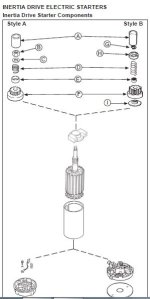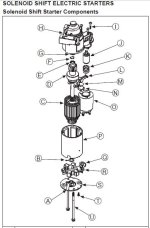To report back, I didn't get a chance to make the light but i brought a bunch of fuses home from work.
I unplugged the regulator and went to start. The starter engaged, didn't turn over but didn't blow a fuse.
Two days ago I ran an interesting test but i don't know if the logic was flawed. In an effort to isolate the starters ability to turn the motor over, I bypassed everything. I rigged up a connection from a fully charged secondary battery (no inline fuse. this may have been a bad idea). I directly connected the battery with jumpers to the starter and was able to turn the motor over. Was this a bad test? Does this prove the starter is good?
Back to yesterday. Upon not turning over the motor, I checked the voltage on the battery and at the starter. I was not getting 12V. I recharged the battery and I then checked the solenoid. It checked negative for continuity between poles. I ordered a new solenoid. It may be possible that the solenoid and/or a magnet was a combined issue. I will retest with a new solenoid to make sure the starter is getting enough power.
I unplugged the regulator and went to start. The starter engaged, didn't turn over but didn't blow a fuse.
Two days ago I ran an interesting test but i don't know if the logic was flawed. In an effort to isolate the starters ability to turn the motor over, I bypassed everything. I rigged up a connection from a fully charged secondary battery (no inline fuse. this may have been a bad idea). I directly connected the battery with jumpers to the starter and was able to turn the motor over. Was this a bad test? Does this prove the starter is good?
Back to yesterday. Upon not turning over the motor, I checked the voltage on the battery and at the starter. I was not getting 12V. I recharged the battery and I then checked the solenoid. It checked negative for continuity between poles. I ordered a new solenoid. It may be possible that the solenoid and/or a magnet was a combined issue. I will retest with a new solenoid to make sure the starter is getting enough power.


